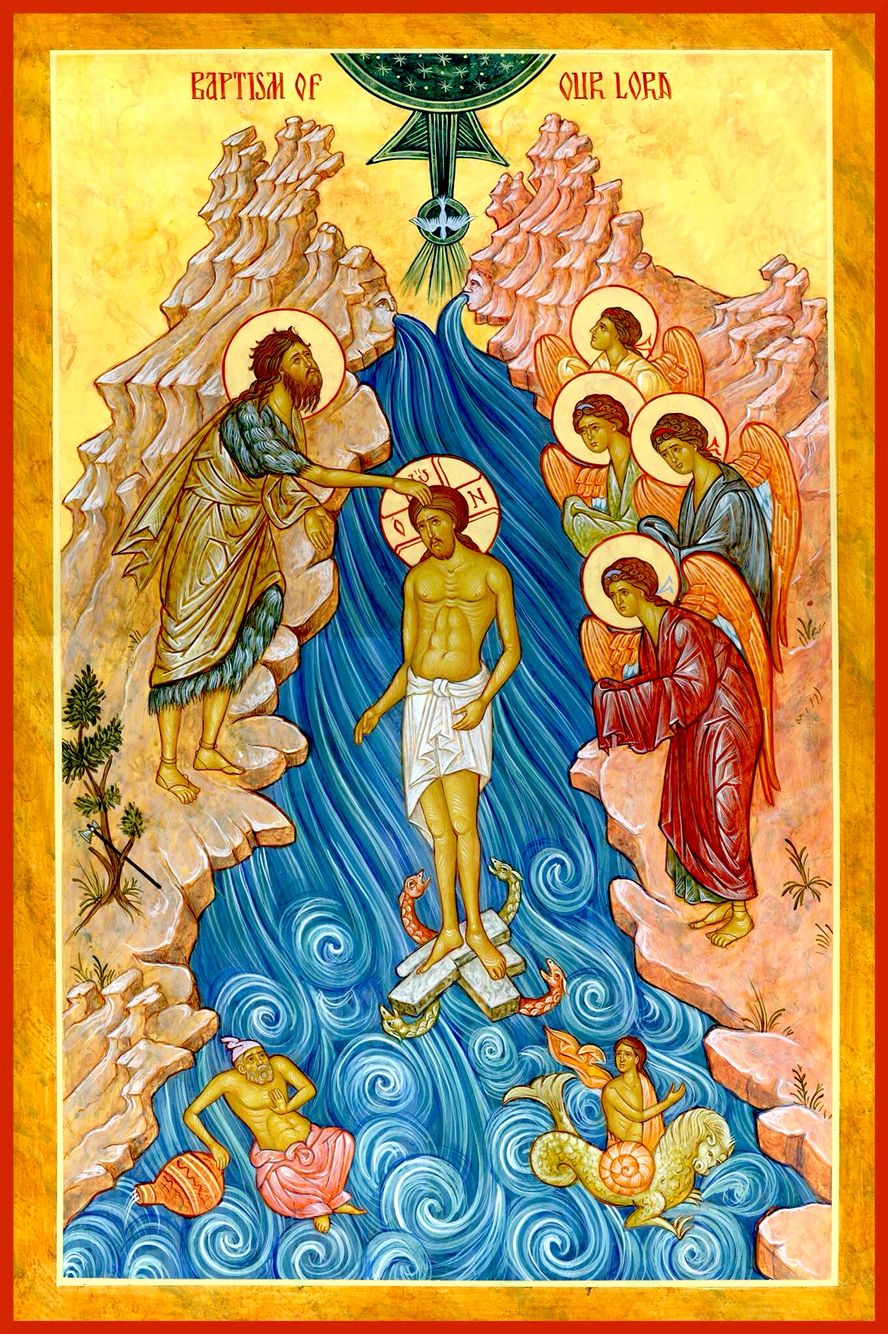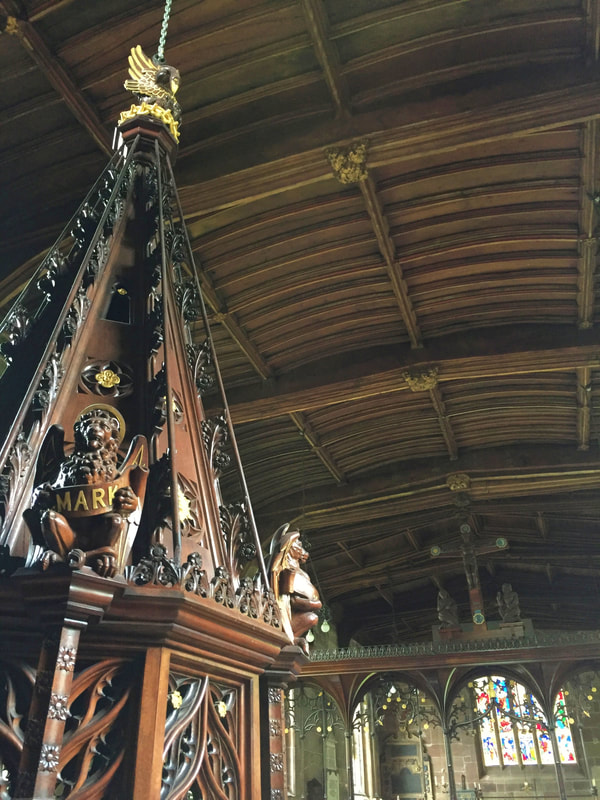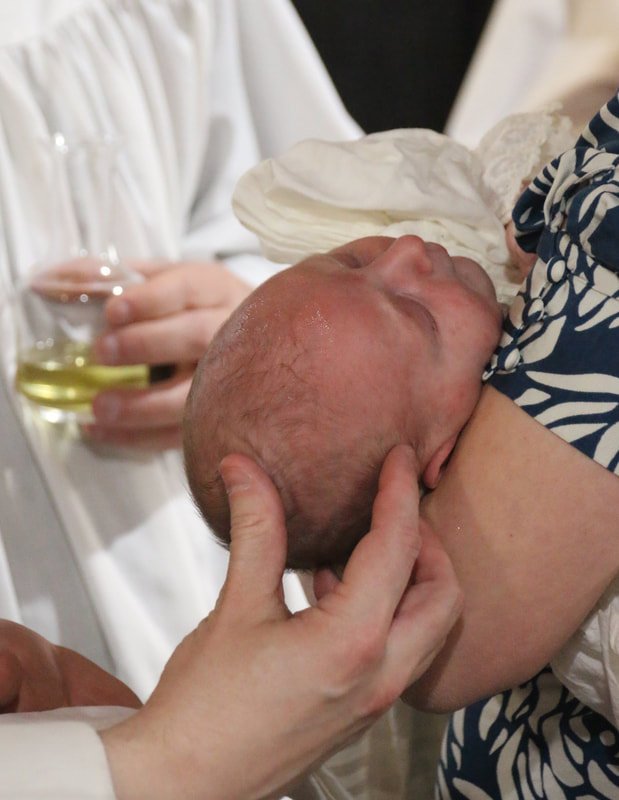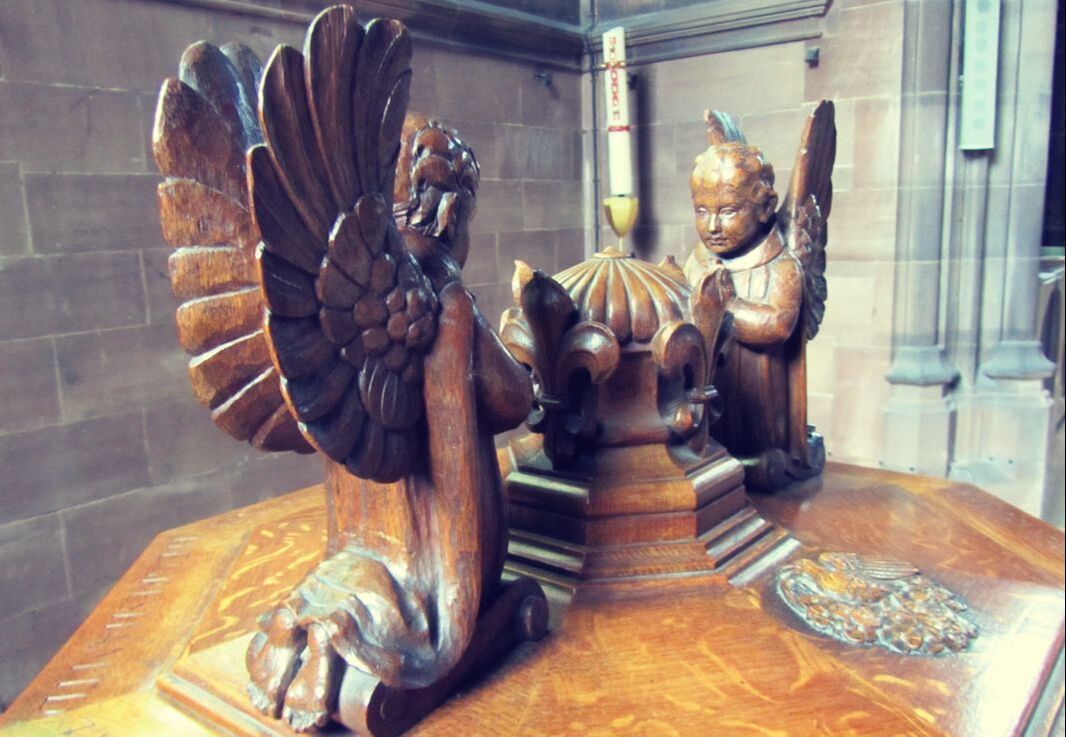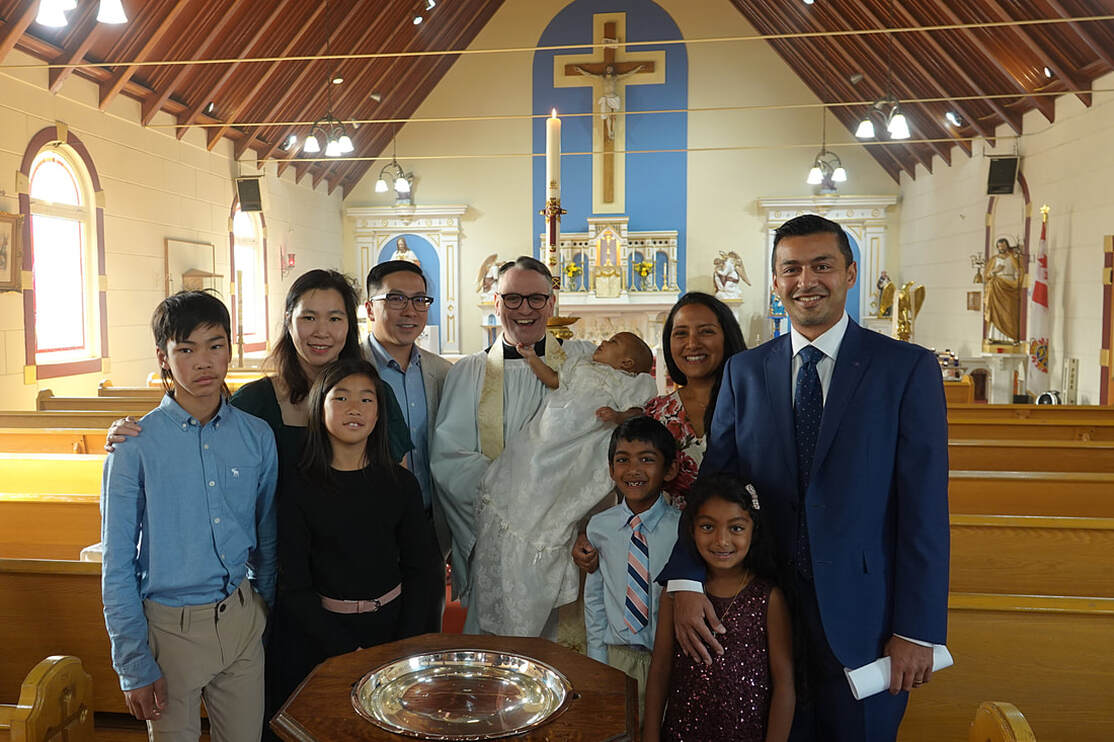The Infant Baptismal Registration Form can be downloaded here.
The Adult Baptismal, Confirmation and First Communion Registration Form can be downloaded here.
The Baptismal Godparent Testimony Form can be downloaded here.
The Adult Baptismal, Confirmation and First Communion Registration Form can be downloaded here.
The Baptismal Godparent Testimony Form can be downloaded here.
Holy Baptism
|
BAPTISM IS THE BASIS OF THE WHOLE CHRISTIAN LIFE, the gateway to life in the Spirit, and the door which gives access to the other sacraments. Through water and the Holy Spirit, men and women are freed from the power of sin and death and are reborn as sons of God and members of Christ's body, the Church.
Faithful to the command of Christ, the Church has celebrated Baptism from the very day of Pentecost as St Peter himself declares: ‘Repent and be baptised every one of you in the name of Jesus Christ for the forgiveness of your sins; and you shall receive the gift of the Holy Spirit’. (Acts 2.38) Baptism is therefore the sacrament by which men and women, freed from original sin, respond to the Gospel call for conversion and adhere to Christ by an unbreakable bond forged by the Holy Spirit. In celebrating the sacrament of Baptism, Christians proclaim their Paschal faith in fidelity to the Gospel so that they may be purified of their sins and rise to newness of life in Christ Jesus. Baptism seals the Christian with the indelible spiritual mark or character of belonging to Christ. No sin can erase this mark, even if sin prevents Baptism from bearing the fruits of salvation. Because of this indelible character, Baptism may never lawfully be repeated once it has been validly celebrated, even if by fellow Christians Churches or Ecclesial Communities. |
These notes are intended to help those exploring Baptism at St John Henry’s. Please read thoroughly before getting in touch with Fr Kenyon for an initial chat.
The Baptism of Adults
Since the beginning of the Church, the Christian initiation of adults responding to the preaching of the Gospel is accomplished in the reception of the sacraments of Holy Baptism, Holy Confirmation, and Holy Eucharist. Through these sacraments, the faithful are made members of the Body of Christ and sharers in the Priesthood of Christ, in Christ’s prophetic and royal mission. Indeed, ‘the communion of the baptised in the teaching of the Apostles and in the breaking of the eucharistic bread is visibly manifested in the bonds of the profession of faith in its entirety, of the celebration of all the sacraments instituted by Christ, and of the governance of the College of Bishops united with its head, the Roman Pontiff’. (Pope Benedict XVI, Anglicanorum coetibus)
The Ordinariates share in the mission of the whole Church of handing on and nourishing the faith received from the Apostles. Through the continual proclamation of the Gospel by the Church, adults in every age are called by the Holy Spirit to conversion of life and to follow Christ the Lord as his disciples. Through Holy Baptism, adults who are baptised are conformed to Christ in the likeness of his death so as to rise with him to newness of life with all their sins forgiven.
Given the unity of the Sacraments of Initiation, unless there is a grave reason to the contrary, an adult who is baptised is to be confirmed in the same celebration and is to participate in the eucharistic sacrifice also by receiving Holy Communion.
The Ordinariates share in the mission of the whole Church of handing on and nourishing the faith received from the Apostles. Through the continual proclamation of the Gospel by the Church, adults in every age are called by the Holy Spirit to conversion of life and to follow Christ the Lord as his disciples. Through Holy Baptism, adults who are baptised are conformed to Christ in the likeness of his death so as to rise with him to newness of life with all their sins forgiven.
Given the unity of the Sacraments of Initiation, unless there is a grave reason to the contrary, an adult who is baptised is to be confirmed in the same celebration and is to participate in the eucharistic sacrifice also by receiving Holy Communion.
The Baptism of Children
‘Born with a fallen human nature and tainted by original sin, children also have need of the new birth in Baptism to be freed from the power of darkness and brought into the realm of the freedom of the children of God.’ (Catechism of the Catholic Church 1250)
The practice of infant Baptism is an immemorial tradition of the Church. Infants are baptised into the faith of the Church, a faith which is professed for them by their Parents and Godparents during the sacramental celebration. For the grace imparted in Holy Baptism to unfold, children must be formed in the faith in which they have been baptised. In this way, they gradually learn God's plan for salvation in Christ and ultimately accept for themselves the faith in which they have been immersed.
The practice of infant Baptism is an immemorial tradition of the Church. Infants are baptised into the faith of the Church, a faith which is professed for them by their Parents and Godparents during the sacramental celebration. For the grace imparted in Holy Baptism to unfold, children must be formed in the faith in which they have been baptised. In this way, they gradually learn God's plan for salvation in Christ and ultimately accept for themselves the faith in which they have been immersed.
Anglican Patrimony
|
In order to provide for the range of situations in the pastoral life of the Ordinariates, Divine Worship provides rites for the Baptism of adults and older children, for the Baptism of infants, for conditional, private, and emergency Baptism, and for the public reception of one who has been privately baptised. Particularly appropriate for Ordinariate communities, there is also a rite for the entrance into full communion with the Church.
The baptismal rite begins with an invitation to prayer and an invocation that the fruits of Baptism be poured out on the one to be baptised. The preparatory rites include the consignatio (tracing the Sign of the Cross on the forehead), an optional imposition of blessed salt, and a prayer of thanksgiving said by the celebrant and people together. Following the Liturgy of the Word, the rite continues with the Promises which, in the case of infant Baptism, includes the anointing with the Oil of Catechumens and the profession of faith formulated as questions addressed to parents and godparents. Adult Baptism maintains an explicit renunciation of sin on the part of the catechumen who, in keeping with Anglican custom, then professes the faith by reciting the Apostles’ Creed. In both instances, the profession of faith is followed by supplications and the blessing of water. |
One feature of Divine Worship: Order of Holy Baptism which warrants further comment are what is known as ‘The Duties’ which, in the order of infant Baptism, follow the Lord’s Prayer, and immediately precede the final blessing. The Duties are exhortations to the parents and godparents concerning their sacred duty to provide for the religious formation of the child. Their specificity is striking, reminding the parents and godparents of their obligation to teach the child the Creed, the Ten Commandments, the Lord’s Prayer, the Hail Mary and to instruct the child in the Catechism so that the child may be presented to the bishop for Confirmation and admitted to Communion in the Body and Blood of Christ. In addition to being a rather felicitous articulation of the role of parents and godparents in sacramental initiation, the Duties were judged to be integral to the Anglican tradition and therefore included in the current liturgical provision for the Ordinariates.
- Bishop Steven Lopes
- Bishop Steven Lopes
Preliminaries
Adult Baptisms are scheduled as part of a person’s catechetical instruction in the Catholic faith. Preparation for Holy Baptism forms part of the catechetical course, taught by Fr Kenyon, that will need to be followed in its entirety. Normally, the course begins in September each year and concludes in Lent, so that the Baptism and Confirmation can take place at the Easter Vigil.
Infant and Child Baptisms (under the age of seven) can be scheduled either within the Sunday Solemn Mass (for parishioners), or on a Saturday afternoon (for non-parishioners).
Child Baptisms (over the age of seven) will, in normal circumstances, be followed by the Sacrament of Confirmation.
Baptisms at St John Henry’s are celebrated according to Divine Worship: Occasional Services, the Ordinariate’s official public liturgy.
Infant and Child Baptisms (under the age of seven) can be scheduled either within the Sunday Solemn Mass (for parishioners), or on a Saturday afternoon (for non-parishioners).
Child Baptisms (over the age of seven) will, in normal circumstances, be followed by the Sacrament of Confirmation.
Baptisms at St John Henry’s are celebrated according to Divine Worship: Occasional Services, the Ordinariate’s official public liturgy.
|
You need to give one month’s notice prior to Infant and Child Baptisms at St John Henry’s. This is to make sure there is enough time to complete all that is required before the day.
For Adult Baptisms, an Adult Baptismal, Confirmation and First Communion Registration Form will need to be completed. This can be downloaded at the top of the page. For Infant and Child Baptisms, a Baptismal Registration Form will need to be completed. This can be downloaded at the top of the page. Preparation. For Infant and Child Baptisms, a short two session preparation course with Fr Kenyon is required for both the Parents and Godparents. This is so that the meaning of the sacrament, the obligations attached to it, and a detailed overview of the rite of Baptism - the liturgical text and sacramental actions - can take place with understanding. The sessions be held at a time that is agreeable to yourselves and Fr Kenyon. Once completed, these sessions need not be repeated in the case of further children. |
Paperwork. A birth certificate is not required for Infant and Child Baptisms. However, it is recommended if the last name of the child is in question or is not the one of the natural father.
Godparents
The role of Godparents in Infant Baptism is especially important since their role as guardians of a child’s faith after Baptism is different from the role of Sponsors in Adult Baptism, who serve as guarantors of a candidate’s faith. Consequently, the Church specifics minimum requirements of all Godparents. All Godparents are:
Parents may not serve as Godparents for their children.
There is to be only one male Godparent or one female Godparent or one of each.
Unless the Godparents are known to the Parish Priest, a certificate of eligibility must be presented by the Godparents to verify their ability to qualify as Godparents. The form can be downloaded at the top of the page.
Godparents are not obliged to be present for the Baptism and may be represented by a proxy.
- Specifically designated by the Parents or the person who takes their place, or in their absence, by the Parish Priest.
- A member of the Roman Catholic Church.
- Usually a minimum of 16 years of age (though a younger age may be approved by the Parish Priest for legitimate reasons in individual cases).
- Recipients of the three sacraments of initiation: Baptism, Confirmation and Holy Eucharist.
- A Catholic in good standing, whose life is lived according to the Precepts of the Catholic Church: 1. attending Mass on Sundays and Holy Days of Obligation, 2. goes to Confession if in the state of serious sin at least once a year, 3. receives Holy Communion at least during the Easter season, 4. observes the days of fasting and abstinence established by the Church; and 5. provides for the material needs of the Church according to one’s ability.
- In a marriage recognised by the Church as valid, if married.
- Living a life consistent with a single person as defined by the Church, if unmarried.
Parents may not serve as Godparents for their children.
There is to be only one male Godparent or one female Godparent or one of each.
Unless the Godparents are known to the Parish Priest, a certificate of eligibility must be presented by the Godparents to verify their ability to qualify as Godparents. The form can be downloaded at the top of the page.
Godparents are not obliged to be present for the Baptism and may be represented by a proxy.
The Christian Witness
It is permissible to have one baptised person from a non-Catholic Church or Ecclesial Community serve as a Christian Witness, together with a Catholic Godparent.
A Christian Witness must be recognised by the Catholic Church as a member of a non-Catholic Church or Ecclesial Community possessing valid Baptism, and must also be a member in good standing in his or her denomination.
Some non-Catholic Churches and Ecclesial Communities that have valid Baptism include: Orthodox, African Methodist Episcopal, Amish, Anglican/Episcopalian, Assembly of God, Baptist, Christian and Missionary Alliance, Church of the Brethren, Church of Christ, Church of God, Church of the Nazarene, Congregational, Disciples of Christ, Evangelical, Evangelical United Brethren, Liberal Catholic, Lutheran, Methodist, Metropolitan Church of Christ, Old Catholic, Old Roman Catholic, Polish National, Presbyterian, Reformed, United Church of Canada, United Church of Christ, United Reformed, United Church of Australia, Waldensian, Zion.
For those Ecclesial Communities whose Baptism is doubtful, invalid, or non-existent, please contact the Parish Priest.
A Christian Witness must be recognised by the Catholic Church as a member of a non-Catholic Church or Ecclesial Community possessing valid Baptism, and must also be a member in good standing in his or her denomination.
Some non-Catholic Churches and Ecclesial Communities that have valid Baptism include: Orthodox, African Methodist Episcopal, Amish, Anglican/Episcopalian, Assembly of God, Baptist, Christian and Missionary Alliance, Church of the Brethren, Church of Christ, Church of God, Church of the Nazarene, Congregational, Disciples of Christ, Evangelical, Evangelical United Brethren, Liberal Catholic, Lutheran, Methodist, Metropolitan Church of Christ, Old Catholic, Old Roman Catholic, Polish National, Presbyterian, Reformed, United Church of Canada, United Church of Christ, United Reformed, United Church of Australia, Waldensian, Zion.
For those Ecclesial Communities whose Baptism is doubtful, invalid, or non-existent, please contact the Parish Priest.
ParentsThe parents of a child being presented for Baptism are not required to be married. If they are married they are not required to produce a document verifying their marriage.
In normal circumstances, at least one Catholic parent must consent to the Baptism of the infant. A parent who asks for a child’s Baptism and is not a Catholic is asked to give permission for the child’s instruction in the faith. |
Costs
No charge is made for the Sacrament of Holy Baptism at St John Henry’s. A donation is always welcome, but this is at your discretion.
Photography & Video
Please make sure that this is discreet during the service. Please ask the photographer or videographer to liaise with Fr Kenyon prior to the service.

